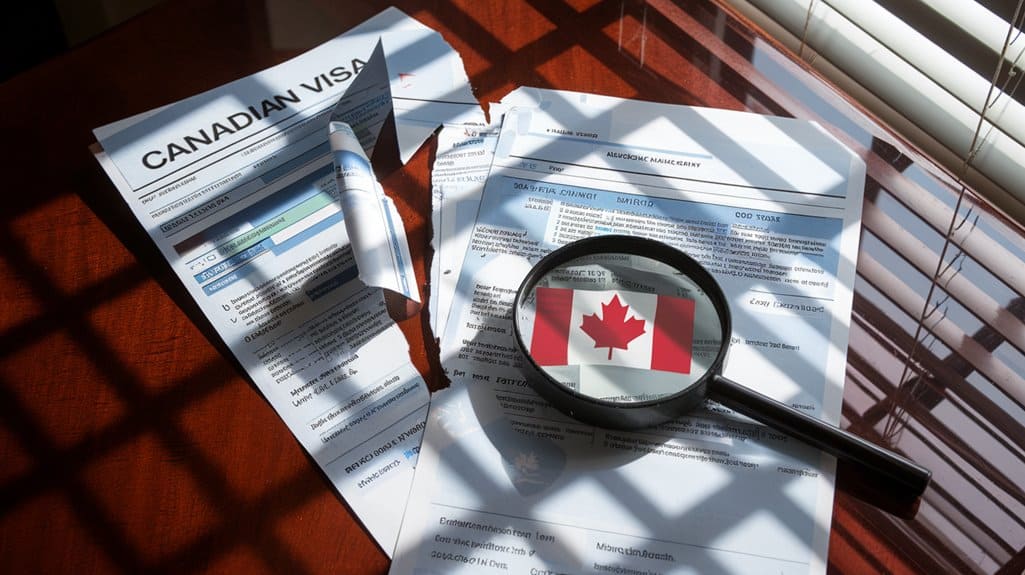
If you’re facing misrepresentation allegations in your Canadian immigration case, you’ll need to understand the serious consequences, including a potential five-year ban. You can defend yourself by responding to Procedural Fairness Letters with thorough documentation and explanations. Working with legal professionals helps navigate the complex appeals process, gather supporting evidence, and develop strong arguments. The steps you take now will greatly impact your immigration future.
Understanding Misrepresentation in Canadian Immigration Law
When you’re maneuvering the complex world of Canadian immigration, understanding misrepresentation is vital since it can have severe consequences on your application and future prospects.
Misrepresentation occurs when you provide false, misleading, or incomplete information to immigration authorities, whether intentionally or unintentionally.
Even unintentional errors in your immigration information count as misrepresentation – accuracy and honesty are crucial when dealing with Canadian authorities.
You’ll be considered inadmissible for misrepresentation if you fail to declare previous visa refusals, submit non-genuine documents, omit family members from your application, or falsify employment experience.
It’s essential to know that even if someone else, like your representative or family member, makes the misrepresentation on your behalf, you’re still held accountable.
If you’re found guilty, you’ll face a five-year ban from entering Canada, affecting both you and your dependent family members.
Common Types of Immigration Misrepresentation Cases
Throughout Canadian immigration proceedings, several common types of misrepresentation cases consistently appear before immigration officers and appeal boards.
You’ll frequently see cases involving undisclosed previous visa refusals, false educational credentials, or non-genuine job offers.
Other recurring issues include unreported marriages or divorces, concealed criminal records, and fabricated work experience documents.
Immigration officers also regularly encounter cases where applicants haven’t disclosed all their family members or have submitted altered financial statements.
Cases of marriage fraud, where relationships are formed solely for immigration purposes, remain particularly problematic.
Additionally, there’s a significant number of cases involving ghost consultants who provide false documentation or advice that leads to misrepresentation, making applicants unknowingly complicit in immigration fraud.
Procedural Fairness Letters and Response Guidelines
Before immigration authorities make a final decision on misrepresentation allegations, they’ll typically issue a Procedural Fairness Letter (PFL) to give applicants an opportunity to address their concerns.
Immigration officials offer applicants a chance to explain themselves through a Procedural Fairness Letter before concluding misrepresentation cases.
This letter outlines specific issues identified in your application and provides a deadline for your response.
When you receive a PFL, you’ll need to gather supporting documentation and prepare a detailed written explanation addressing each concern.
You should explain any discrepancies, provide context for your actions, and submit evidence to support your claims.
It’s essential to respond within the given timeframe, as failing to do so may result in an automatic finding of misrepresentation and a five-year ban from entering Canada.
Given the complexity and serious consequences, seeking legal assistance is highly recommended.
Legal Consequences and Five-Year Ban Implications
A finding of misrepresentation under Canada’s immigration laws carries severe consequences that’ll impact your ability to enter or remain in the country.
If you’re found guilty of misrepresentation, you’ll face a five-year ban from entering Canada, starting from the date of the final determination or removal order.
During this ban, you won’t be able to apply for permanent residence, temporary residence, work permits, or study permits.
The consequences extend beyond just you – your dependent family members may also be affected by the finding of misrepresentation.
Even after the five-year period ends, the previous misrepresentation finding will remain on your immigration record and could affect future applications, requiring you to demonstrate heightened credibility in subsequent dealings with immigration authorities.
Building a Strong Defense Against Misrepresentation Allegations
When you’re facing allegations of misrepresentation in your Canadian immigration case, building a strong defence requires careful preparation and attention to detail.
You’ll need to gather extensive documentation that supports your position and explains any inconsistencies in your application.
Start by collecting all correspondence with immigration officials, original application materials, and supporting documents.
Thorough documentation is your foundation – gather every piece of correspondence and paperwork from your immigration journey before proceeding.
You should prepare a detailed written explanation addressing each concern raised in the allegation letter.
It’s essential to provide evidence that demonstrates either the accuracy of your submissions or shows that any errors were unintentional.
Consider including affidavits from employers, family members, or other relevant parties who can verify your claims.
Remember to respond within the specified timeframe, as missing deadlines can seriously harm your case.
Humanitarian and Compassionate Considerations
If your immigration case involves misrepresentation allegations, you’ll need to understand how humanitarian and compassionate factors can strengthen your appeal.
These factors include your establishment in Canada, potential hardships you’d face upon removal, and impacts on your family members, especially children.
To support your case, you’ll want to gather compelling evidence such as letters of support from community members, employment records, and documentation of any medical conditions affecting you or your dependents.
You should also demonstrate your contributions to Canadian society and explain any circumstances that led to the misrepresentation.
If you’re caring for family members or have strong ties to your community, these elements can greatly influence the decision-maker’s evaluation of your case.
Evidence Requirements for Immigration Appeals
Building on your knowledge of humanitarian considerations, strong evidence forms the backbone of any successful immigration appeal.
A solid foundation of compelling evidence is crucial for winning immigration appeals and addressing humanitarian factors effectively.
You’ll need to gather thorough documentation that supports your case, including employment records, financial statements, and personal references.
For immigration appeals involving misrepresentation, you should provide clear evidence that either refutes the alleged misrepresentation or explains any unintentional errors.
This can include original documents, sworn affidavits, and expert testimony. If you’re claiming hardship, you’ll need medical records, psychological assessments, or country condition reports.
Remember to authenticate all documents properly and provide certified translations if they’re not in English or French.
It’s essential to organize your evidence chronologically and submit it within the specified deadlines to guarantee the Immigration Appeal Division considers everything in your case.
Appeal Process and Potential Outcomes
Understanding Canada’s immigration appeal process starts with the Immigration Appeal Division (IAD), which serves as your primary avenue for challenging decisions about sponsorship, removal orders, or residency obligations.
You’ll need to file your appeal within 30 days of receiving the decision, and you’ll be required to submit detailed documentation supporting your case.
During the appeal hearing, you’ll present your evidence and arguments before an IAD member.
They’ll consider factors like the nature of the misrepresentation, any humanitarian and compassionate grounds, and the strength of your evidence.
The IAD can make three possible decisions: allow your appeal and overturn the original decision, dismiss your appeal and uphold the original decision, or stay the removal order with specific conditions you must meet.
How Canadian Currents Immigration Can Help
When faced with immigration misrepresentation challenges, Canadian Currents Immigration’s team of seasoned professionals stands ready to guide you through every step of the process.
Our experienced lawyers, consultants, and paralegals work together to provide thorough legal support tailored to your specific situation.
Our team can assist you with:
- Responding effectively to Procedural Fairness Letters
- Preparing detailed documentation and evidence for your appeal
- Developing strong arguments based on humanitarian and compassionate grounds
- Representing you before immigration authorities and appeal boards
We’ll help you navigate the complexities of immigration law while ensuring your rights are protected.
You’ll benefit from our decades of combined experience in handling misrepresentation cases, as we work to achieve the best possible outcome for your immigration matter through efficient and cost-effective legal services.
Frequently Asked Questions
Can I Travel Outside Canada While My Misrepresentation Appeal Is in Process?
You shouldn’t travel outside Canada during your misrepresentation appeal. If you leave, you might be denied re-entry and could jeopardize your appeal process. Stay in Canada until resolved.
How Long Does IRCC Typically Take to Process a Misrepresentation Appeal?
You’ll typically wait 12-18 months for IRCC to process your misrepresentation appeal, though processing times can vary depending on case complexity and current application volumes.
Will Hiring an Immigration Lawyer Increase My Chances of Winning?
Yes, hiring an immigration lawyer can greatly increase your chances of success since they’ll expertly prepare your case, handle complex legal arguments, and guarantee all documentation properly addresses misrepresentation concerns.
Can Previous Successful Immigration Applications Be Affected by a New Misrepresentation Finding?
Yes, your previous successful applications could be affected if IRCC discovers past misrepresentation. They can revoke your status and ban you from entering Canada for five years.
Are There Expedited Appeal Options for Cases Involving Separated Families?
You won’t find expedited appeal options specifically for separated families, but you can request urgent processing if you can prove significant hardship or compelling humanitarian circumstances.
Conclusion
If you’re facing misrepresentation allegations in your Canadian immigration process, don’t delay in taking action. You’ll need to respond effectively to Procedural Fairness Letters, gather strong supporting evidence, and understand your appeal options. Whether intentional or not, these allegations carry serious consequences, including potential five-year bans. Working with experienced immigration professionals can help you navigate this complex process and protect your immigration status.

We serve ALL of Canada. Currently have offices Western Canada — Vancouver, Calgary, Edmonton, Kamloops and Red Deer. We also have the infrastructure to work with any of our clients virtually — even from the furthest regions of the Yukon to Newfoundland.
Call (778) 331-1164 [toll free 1 (844) 715-0940] to get routed to the best office for you or contact us online to schedule an appointment.
We also have a dedicated intake form to help you get the ball rolling. Our intake team will review your specific case and advise you on the next steps to take as well as what to expect moving forward.
Our offices are generally open 8:30 a.m.—4:30 p.m., Mon—Fri.

Shantale D’Aoust
IMMIGRATION LAWYER
Shantale has vast advocacy experience, and she strives to help her clients navigate through their legal issues by assessing risks to provide practical options and tailored solutions to their unique legal matter. Her core areas of practice include permanent residence and temporary residence applications and appeals, and matters involving the interplay between immigration laws and family law issues.



